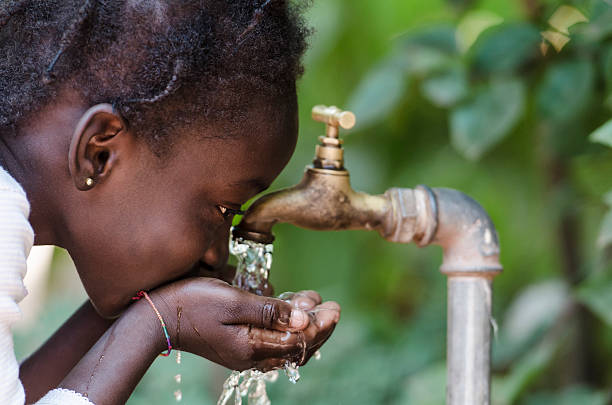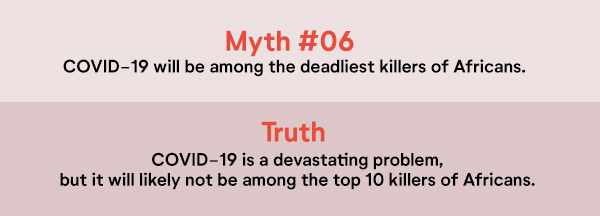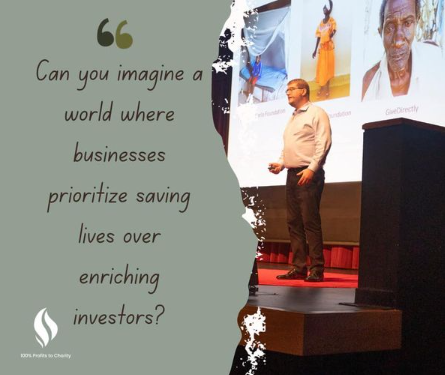| SPOILER ALERT: There are lots of numbers below that could overwhelm you and keep you from reading on or — perhaps worse — numb you to the reality that each of these numbers actually represents a human being — many of them under five years old.
Although COVID-19 threatens the health, wellbeing and economy of Africa, it is very unlikely to be among the top 10 killers in 2020. As I write this in mid-July, there have been ~665,000 reported cases of COVID-19 in Africa and ~14,360 deaths. Contrast those numbers with the World Health Organization’s report about malaria deaths for 2018: ~380,000 Africans died of malaria with ~255,000 of the deaths among children under five years old. Does this mean COVID-19 is not a major problem for Africans? Certainly not!
|

Myth #06: COVID-19 will be among the deadliest killers in Africa
Share this story:
Related stories:
“Profit for Good” and the power of consumer choices to save lives: How “The Life You Can Save” Inspired the Birth of the Profit for Good Initiative
In this Supporter Story, we hear from Brad West, Founder of the Profit for Good Initiative, which promotes “Profit for Good... Read more >
Uncharitable: The way we think about charity is dead wrong.
Last month, I attended a preview screening of the thought-provoking film Uncharitable. Based on Dan Pallotta‘s 2013 T... Read more >
Categories:
- Agriculture and Farming
- Books
- Children
- Economic Development
- Education
- Effective Giving
- Environment
- Events
- Finding Fulfillment from Giving
- Friends and Family
- Fundraising
- Giving Games
- Giving Pledge
- Health and Infectious Diseases
- Hunger and Nutrition
- In The News
- Marketing
- Millennials
- Partnerships
- Peter Singer
- Philanthropy Education
- Refugees
- Religion
- Research and Evidence
- Setting and Achieving Giving Goals
- Social Media
- The Life You Can Save book
- Uncategorized
- Water and Sanitation
- Women and Girls
- Yearend Giving
About the author:
Charles Bresler
Co-founder, Board MemberAfter earning a PhD in Social and Clinical Psychology, Charlie Bresler became director of behavioral medicine for The California School of Professional Psychology, Fresno (CSPP-F), where he was a full-time professor and founder of a teaching clinic for anxiety & stress disorders. In 1993, he was recruited by The Men’s Wearhouse, where he went on to be head of human resources, stores, marketing, and, ultimately, president. He stepped down in 2008 to fulfill his long-standing desire to work directly on social and economic issues, not too long after he read Peter Singer’s book, The Life You Can Save. Catalyzed by the concept, Charlie reached out to Peter and proposed combining Peter’s theory with the formation of a nonprofit to advance Peter’s ideas and to raise money for high-impact, cost-effective organizations. Together, they founded The Life You Can Save, where Charlie took on all organizational operations as executive director until 2024. He was supported in this work and in his financial support for the organization by his wife Diana, a family physician, and executed the role pro bono.



